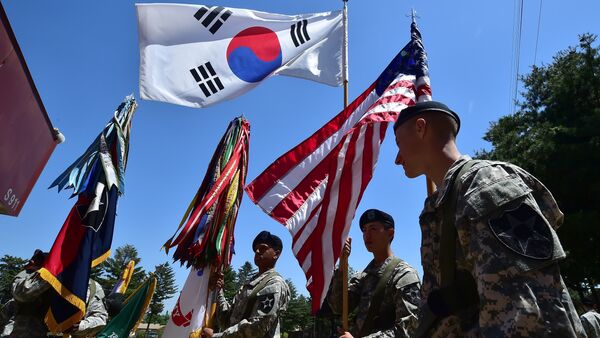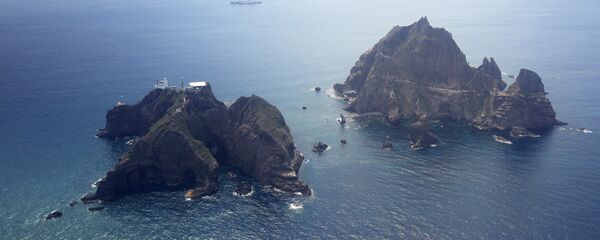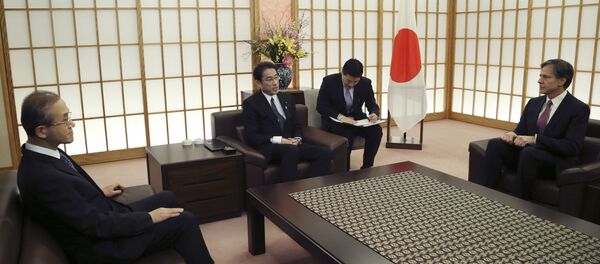This did not go unnoticed by experts who noted that in Japan, the events had a somber nature, while in North and South Korea the anniversary was one of celebration and a public holiday.
In addition, on the eve of the event, a South Korean group of deputies visited the disputed islands of Dokdo (Takeshima). Japan through diplomatic channels demanded that the South Korean side restrain from making the trip but South Korea still went ahead with it.
Somehow, Tokyo and Seoul's reluctance to hear each other’s side has become particularly evident in the celebration of historical dates, according to Head of the Korean program at the Institute of Economy, Russian Academy of Sciences Georgy Toloraya. The expert spoke to Sputnik in an interview.
“The relationship of the two countries is still far from rosy, with historical dates, in fact, only adding fuel to the fire. Despite the persistent efforts of America to reconcile two of its main allies in the Asia-Pacific region during the past few years, South Korean President, Park Geun-hye and Japanese Prime Minister Shinzo Abe almost never meet,” Taloraya said.
In an effort to overcome this gap by just a little, Tokyo and Seoul recently made an attempt to resolve a historic event. The catalyst for this was the long-awaited decision by Tokyo to recognize at the government level the problem of the so-called “comfort women," Korean women who were kidnapped and used in Japanese brothels during the Second World War.
It was decided that these women should receive compensation for what they were put through. After which it would seem that the matter would be closed.
However, that was not the case. According to the expert, “The Japanese government most likely made the compensation attempt quite late because the public reaction in South Korea was not met with understanding. Moreover, the majority of South Koreans believe this deal to be dishonorable because the honor and dignity of these women have not yet been restored,” Taloraya said.
He further explained that only a few of those women are still alive, although the protests, though less frequently, still continue to this day.
The expert noted that even now anti-Japanese sentiment in South Korea is still very strong. Therefore, historical dates in both the countries arouse feelings of nationalism.
“Especially today, when Japan is taking a more serious course of militarization and making attempts to restore its imperial power. In all the neighboring countries of Japan this is a matter of apprehension raising serious political concerns,” Taloraya said.
Recently, Japan and South Korea agreed on the transfer of intelligence collected by the US missile defense system, which is to be established in South Korea. Due to the placement of the anti-missile system in South Korea, protests erupted with such strength that South Korean President, Park Geun-hye was threatened with impeachment.
In addition, Seoul's relations with Beijing have been complicated, as the actual placement of the US missile defense system on the Korean Peninsula has been called a “Chinese factor” by some experts.
“To be friends with each other against someone, Japanese and Koreans do not really want that. However, the relationship with Washington is at the foundation of national security for Seoul and Tokyo. In this trilateral alliance, Americans are playing the main violin and it is unlikely that anything will change,” Toloraya noted.
So far it is difficult to say what the future holds for the relations of this trio. “Furthermore it will be clear when there is a change in the South Korean administration and in the longer term during the change of the Japanese government. It also depends on the next US administration.”
“After all, if we assume that the new US president will be Trump, he has already clearly outlined the complete lack of desire to support his allies,” the expert said.
Most probably, strategic relations between Washington, Tokyo and Seoul are not in danger. Nonetheless, the prerequisites for serious Sino-South Korean ties in the near future are not yet visible, the expert concluded.




